The first time I cried while eating an ice-cream was nearly 30 years ago on Sidmouth beach. My mint choc chip had fallen to the ground and mum had argued with the server until I got another one. It was too much emotion for the little boy. Grief for the green blob melting on the concrete, fright at the temper mum had shown, relief for the soft flavours sliding down my throat.
That makes this the second time. With one hand I’m holding my scoop from Flavours, the best of the John o’Groats ice-cream shops. With the other, I am knitting a mixture of tears and vanilla residue into the ragged beard formed over the 78 days it has taken me to walk from Land’s End. I am shoeless, as I am always when my feet are resting, and stinking in the way one does after five days without a shower.
The queue snaking from the back of the shop becomes awkward. These people had come here to take a photo in front of the famous sign, not to console a craggy stranger. I sit down on a bench, issue a few defiant licks, and try a gesture to assure the haze of fleeces and leggings and cagoules that everything is OK. I am aware that I look and smell a long way short of that.
The tears are not purely sadness, though there’s a lot of that, too. In his book, A Walk in the Woods, Bill Bryson describes the daily dose of low-level ecstasy that he felt while walking the Appalachian Trail. I’ve had the same and, after two and half months, I can feel the comedown coming.
I’m hungover, too, thanks to the locals at the Village Inn in Keiss. Arriving about 6pm the night before, I bought one beer to plan the final day. I didn’t buy another all night, but they arrived with regularity. Pints, mint flips, wee drams. I was their entertainment, this tired tanned man from the wild amid the electricians and pipefitters, and here were my rewards. I woke at 5.30am with poisoned blood to find I had slept on the grassy top of a pillbox on the coast. Out to sea, gulls were calling through the haar and a foghorn was blaring, boats on their way out for the morning catch.
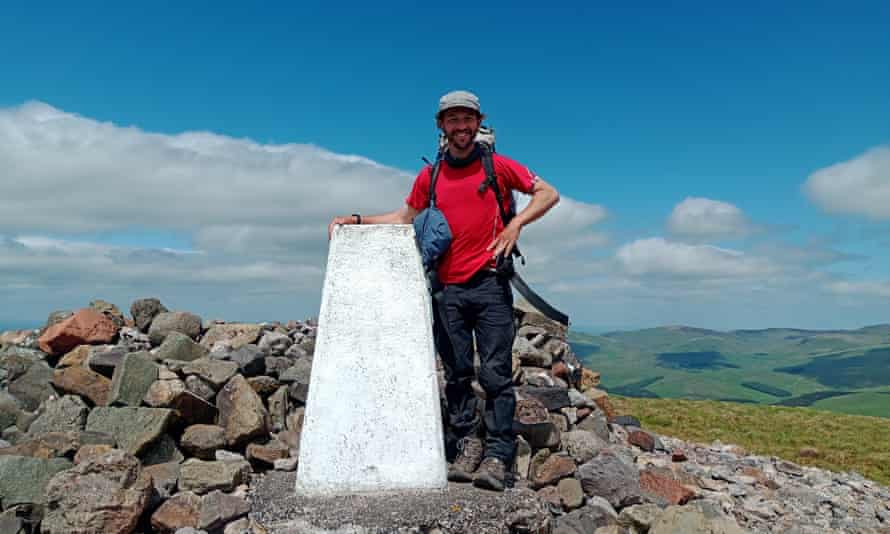
The mist is thick and disorienting here, too. It casts a veil of deadness, a sense that things have already happened. Perhaps time feels weird because for so long there has been nothing beyond my finishing date. By setting out on the walk, I had made the world a bubble of self-absorbed certainty. The divisions of responsibility were obvious: bag, route and provisions were my domain, weather not. Now, lines were blurring. The plans and branching futures, the conflicts and compromises of relationships, of existing in the world with other souls – it all lay vague and shapeless, whispering beyond that mist.
The trail had made life simpler, then, and part of that was being free of structure. For two and a half months I had shat in woods, poured dried muesli into my mouth in town centres, slept on steepling cliffs and under crashing waterfalls, lanced blisters in dank cafes, drunk from the Camel, the Tyne and the Tees. I felt slack, gaseous and floating above and away from the basic gravity of normal life. Now, though, the end was here, bringing with it the bondage of society.
Over the next few days, I would be cooled and poured slowly through a funnel into the mould of a man I used to look like. It’s necessary work; I can’t live like this for ever. But it’s a painful process. And as the elation and relief of finishing mixes with the sadness of the sea haar and the return of uncertainty and future and convention I am utterly overwhelmed, and yield. It’s too much emotion for the little boy.
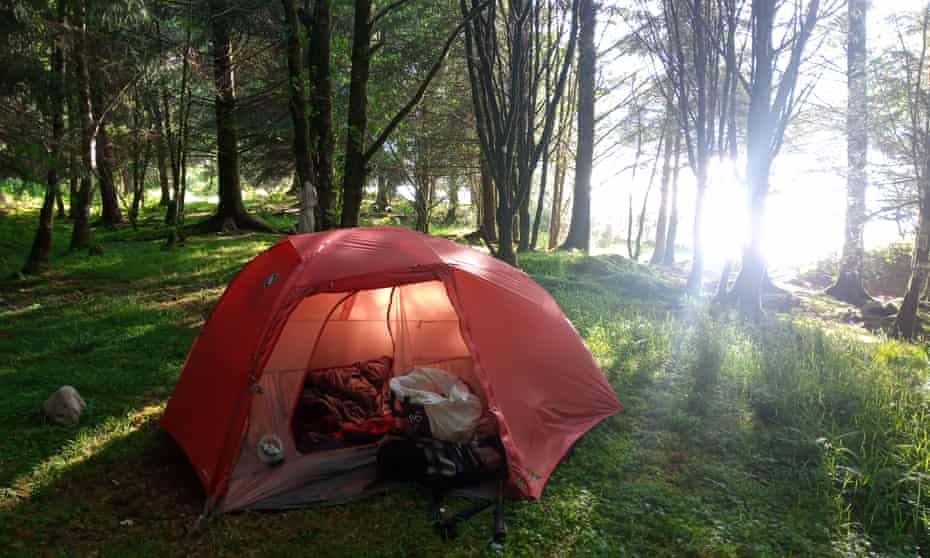
As a tear drops to my sock, I realise that my feet are sodden from the morning’s walk. I’m transported back to May, when cows mad with hormones had chased me and a friend down a steep bank into the River Severn. As we looked up to the wall of hooves and horns, and turned to contemplate swimming to the other side, I collapsed into the mud, soaking my bag and, worse, my feet. Chuckling farmers with huge hands came to our rescue, but everything stayed damp for a month as I trudged through England’s wettest May since 1967.
For a long time I wondered if the moment would come. Nothing about the entrance to the slate-topped village of Ilam in Staffordshire suggested it was imminent. Through another deluge, I pulled my hood low, and could see teens in steamy windows laughing at me. Then, as I climbed Bunster Hill on the western edge of Dovedale, the rain stopped, the greys gave way to greens and the low evening sun lifted moisture from the soil in dazzling swirls. At the top of the valley, rabbits raced down the sharp slope, flicking sparkles behind. As I sucked the sweet air, I looked into a hedgerow and felt my nerves invert, my stomach drop. There it was – the moment – the reason I had come out here. I was high.
As Laurie Lee wrote in As I Walked Out One Midsummer Morning: it was the thrill of looking “out on a world for which I had no words, to start at the beginning, speechless and without plan, in a place that still had no memories for me”. I had the same feeling at Malham Cove with the sky as blue as a wizard’s hat; in the Eden of upper Teesdale where curlews cried and zipped along the river; on an eyrie at dawn above Loch Ness where mist licked the feet of towering pines and the sun peered down bemused.
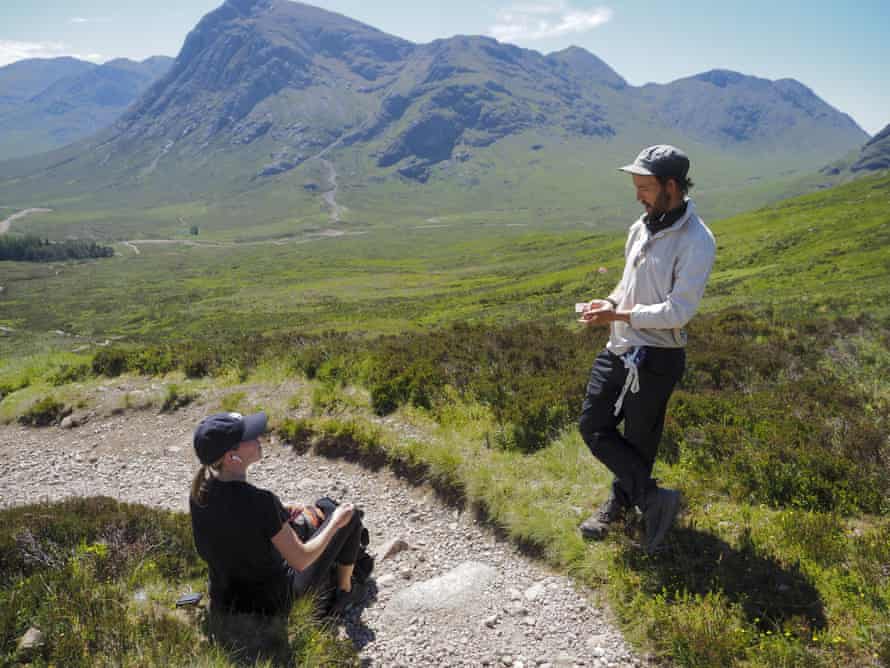
I knew before that Britain was beautiful. What I didn’t know was that its nature could have this effect. Or perhaps I had just forgotten. Over years of managing self-loathing, I’ve learned that becoming detached from emotions can lead to a sort of safety. But, I realised there in Dovedale, that the separation brings a risk of sterility. Of dousing all fires in the heart. As I sat on wet bluebells and looked out to the black hills on the horizon, I saw that sometimes it’s the most exhilarating thing to forget mindfulness, to saddle instinct and urge and hold on tight. Perhaps wild nature is the safest place to try.
A lady in a mac motions a tissue towards me. I wave her away with a smile. I had seen a lot on my way here. As I entered Glastonbury at 9am on a Wednesday morning, a middle-aged man in a top hat brought his palms together in namaste, then dropped to his belly and mimed shooting me with a rifle. At a campsite outside Marsden in the Pennines, a half-naked geordie suckled an infant bulldog while showing me round the shower block. In Hebden Bridge in West Yorkshire, a woman in a mobility scooter with psychedelic leggings and a wide-brimmed leather hat shouted at me about kicking a disobedient stallion in the balls.
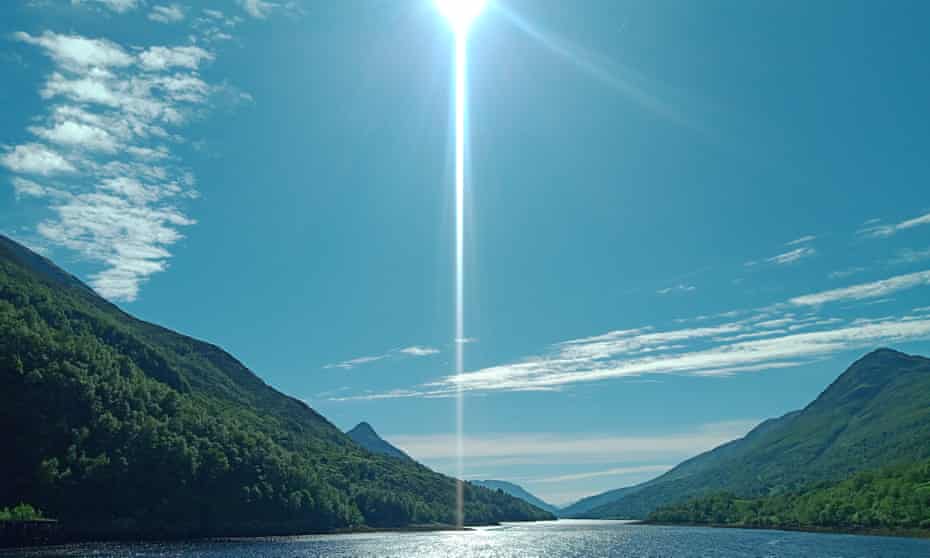
I had better opening conversations, but none that started friendship. The nomadic life is inimical to anything lasting. Yet when old pals joined me for days at a time, our ties grew stronger – and through confession as much as comedy. It helps that my generation is one with the language and permission to discuss feelings. It helps, too, that we are no longer children, that the hierarchies of youth are less inhibiting. But there’s something special about being out on the trail. Small talk and catchup is soon exhausted and for the hours that follow, as the gaze is drawn to the horizon, there is minimal eye contact to intimidate, nor risk of meaningless facial expressions being interpreted as judgment or mirth.
With two school friends, we spoke of the stresses of parenting, of frets over being a bad son. With another, I learned of the weird things long Covid can do to a brain, like mixing up the word lamb for window. Another friend told me, over a bottle of beer in a Co-op car park, how it felt to lose his job to Covid, to be forced to move into a one-bedroom flat with his wife and two daughters, to be on a waiting list of 40,000 people to get back to see his sick dad in Australia.
For the most part I had no company and loved it. But while solitude has always been solace for me, its extent here was a challenge for a man with a brain not always on his side.
Still, something might have clicked. I have often been urged to meditate, and struggled. If the art of meditation might best be described as carving out time to do nothing, those who need it most – with restless magpie minds – surely find it hardest to begin. Walking may be part of the answer. As Rebecca Solnit points out in her book Wanderlust, it’s an act so simple that doing it is almost doing nothing in disguise (at least for those with the privilege of health). By walking, threading myself through the world like a slow needle through silk, I found my body and mind could connect. Without the distractions of conversation or calls or podcasts, the physical senses could take over: twinges in the back, cooes from the branches, wafts from the undergrowth. Productive thoughts had space to relax, stretch out, find new friends. Bad ones could float away with the clouds over the hills.
After half an hour, my girlfriend arrives and I simply dissolve. She props me up with a hug, smears away the tears and we go down to the little sign and take a photo. You’ve done it, she says, you’ve done it.
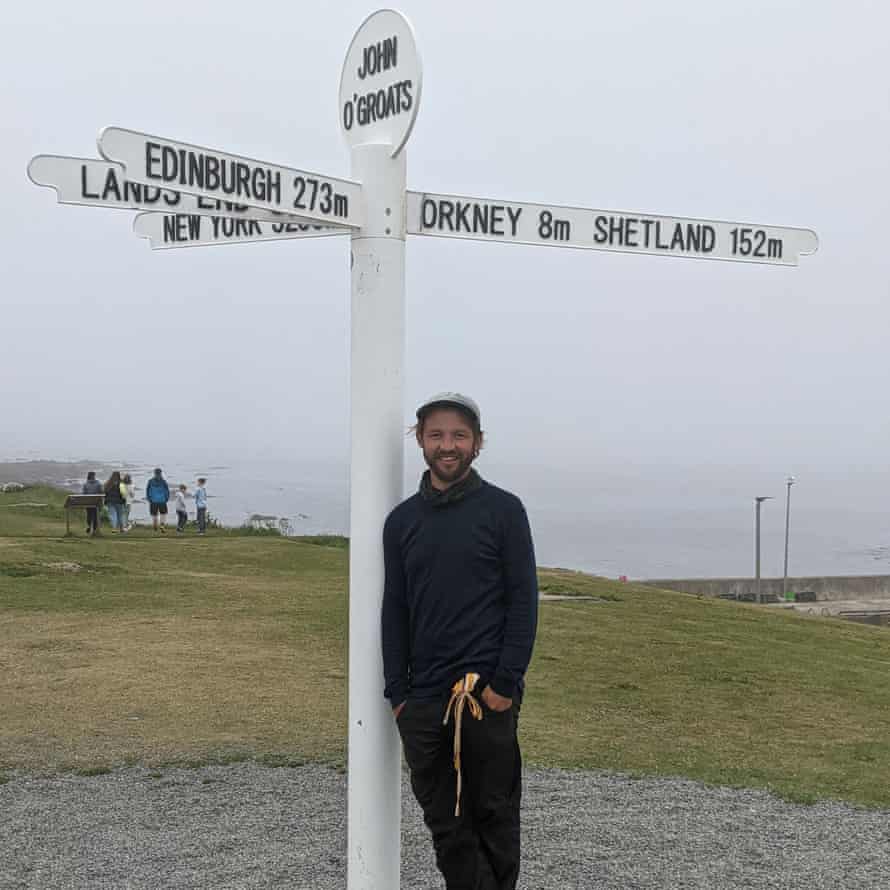
More than one person has said that the walk was a brave thing to do. People are nice. But beyond setting off, the walk didn’t demand much bravery. The greater challenge is working out which parts of the walk to bring back to normal life, and how.
I know a little of what not to do. After returning home, I caught myself counting things that didn’t need counting: books, hangers, masks. On the trail, absolute knowledge of inventory is essential, and becomes a comfort. I realised quickly that it’s too much to expect the same from the jumble of normal life.
But perhaps there are three important souvenirs. First, knowing that peace comes with understanding what is in my control and what is not. Second, that I need more of the naked thrill of the wild, a regular pinch of hemlock in my tea. Third, and I think most of all, that some of the things I thought possible as a child really are. That if I can walk 26 miles across the Cheviot hills into Scotland with a 15kg pack, perhaps there are other feats within my grasp. That I have agency in the world, the resources to resist convention, some command and power over my one life. Now it’s time to use it.





